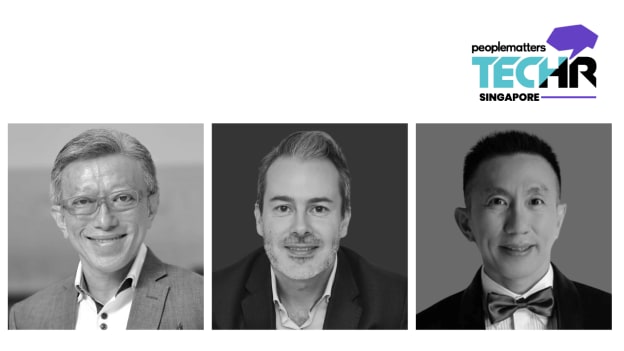Identify the roadblocks to rethink what’s possible in the ever-evolving world of business at People Matters TechHR Singapore 2022

Organisations around the globe weathered many a storms during Covid-19. Its unmistakable presence in the landscape of modern business changed the way we work, live, and interact. While earlier the biggest potential problem used to be the unexpected dips in the market or a scandal driving away investors, now, HR leaders, stakeholders and CEOs are forced to rethink ways to overcome several artificial barriers.
To crush such roadblocks and offer actionable insights on the future of work, we interacted with leaders including Darren Thayre, Head of Innovation, Global Strategic Initiatives (APAC, Japan and China), Google, Ching Hong, CEO, Fujifilm Business Innovation and Chee Gay, who is Global Chief Human Resources Officer, TDCX. They will also be attending the People Matters TechHR Singapore 2022, which is Asia’s largest HR and WorkTech conference, taking place on August 25 and 26 at Marina Bay Sands, Singapore.
Prior to the summit, we conducted an exclusive pre-conference LinkedIn Live for People Matters TechHR Singapore 2022. During the same, these leaders identified the artificial barriers that organisations need to overcome to be able to rethink what’s possible in the ever-evolving world of business and work.
After all, technological advancements have entirely reshaped organisations by making their business processes highly integrated and more streamlined. The advancements have also facilitated many businesses in running their tasks smoothly and performing better than ever before.
For thorough understanding, we bring you insights and thoughts of the leaders from the exclusive pre-conference. From trends and technologies to what will change the shape of people and work agenda in organisations, Darren Thayre, Ching Hong and Chee Gay talked about taking a step toward big changes. Take a look!
Virtual Reality, the technology of the future
We know the pandemic placed countries all over the world in a perilous position. Looking at the technology landscape, so much happened and converged. Leaders around the globe adopted one or the other trend that supported or transformed their businesses and its culture. Chee Gay, who is the Global Chief Human Resources Officer, TDCX, benefitted by using Metaverse and virtual reality.
Commenting on the same, he said, “Things that got me excited were Metaverse and virtual reality. Learning how we can use gamification in our hiring, learning, chatbox and machine learning was quite exciting. Those are the things we have been using in our organisation a lot of times and we've optimised it by including cloud computing.”
Darren Thayre, Head of Innovation, Global Strategic Initiatives (APAC, Japan and China), Google, shared that the technological advancement amid the pandemic changed the way one looks at people and culture. “When I think about hiring, onboarding, engagement, so much has changed. I boarded myself remotely and almost never met most of my global folks on the team. I think there's a new business model and there's access for people with disabilities and mental health issues. I think it's not without its challenges, but I think it's super exciting. And as long as you don't get too carried away with it, taking over the world, I think there’s a huge opportunity there.”
The pandemic taught us to know our employees and their potential
CEO of Fujifilm Business Innovation, Ching Hong, doesn’t consider himself a ‘technology guy' when it comes to connecting with people. “I am not a technology guy. Perhaps from my personal perspective, I think when we're looking at people in analytics, we should want to know everything. Right from our core, our employees are data,” said Ching Hong.
He further added, “The most important thing is having a deeper understanding by using whatever technology or software is available and then harnessing it, knowing our people better. This to me, I think will bring us into the new normal.”
Inclusive experience that Metaverse can provide
Working from various locations can be tricky for employees and leaders when there is a lack of an efficient way to communicate and interact. Metaverse can expand the definition of hybrid work. Thanks to this technology, employees have the potential to collaborate remotely and engage in a more authentic and human way.
Thayre revealed how he used Metaverse to connect with people and its outcome. “So I'm involved with a bunch of startups, mostly outside of my Google job and they're in all corners of the Earth. But when we didn’t have the luxury of jumping on a plane, we experimented with one of my startups using a virtual reality Metaverse sort of environment.”
“I would say it enhanced the experience from just video calls to being much closer to being in the room together and we got deeper into topics faster, and everybody felt like they were included. But, I don't think I'd want to do it all day every day. You know, having the headset on looked a little weird and it was a bit uncomfortable and clunky at times, but in chasing the outcome and making us all feel part of that discussion. We definitely got to a better place,” he added.
Chee Gay shared how employees at his organisation have been introduced to the digital world. “At TDCX, we are providing a much better digital experience. For example, when a candidate applies for a job, we are able to revise the data through the personality tests that we have collected during the assessment. During the interview process, we either recommend a job that is most suitable to them rather than the job that they prefer. That's one area that we see over the years of how data insights will enable us to create value.”
HR needs to rebrand themselves
Human Resources today is a dynamic department that assists in using different technologies to automate processes and improve communication. However, there are more critical skills that HRs need to adapt to be able to capture the opportunities of technologies with speed.
Thayre said, “Historically, we've kind of had this concept in companies, where there's like a front of the house, the team that drives sales and revenue. And then there's kind of back-of-the-house support services including HR, legal, maybe even IT. I think in this conversation, we need to flip that and HR needs to rebrand and reinvent themselves to think of themselves as the business at this moment.”
To learn more from leaders, join us in Singapore for People Matters TechHR Singapore 2022, Asia’s Largest HR and WorkTech Conference on August 25 and 26, 2022. Click here to register! This is your chance to become a better leader for tomorrow, today.















